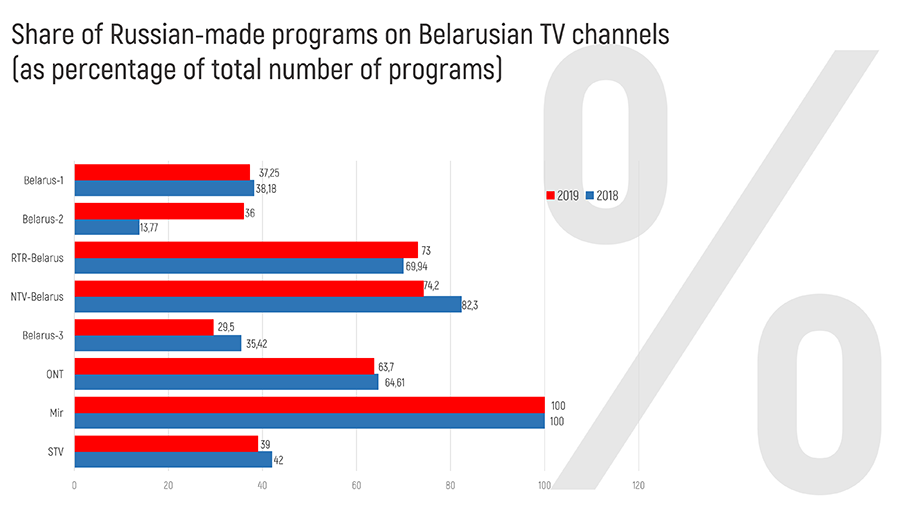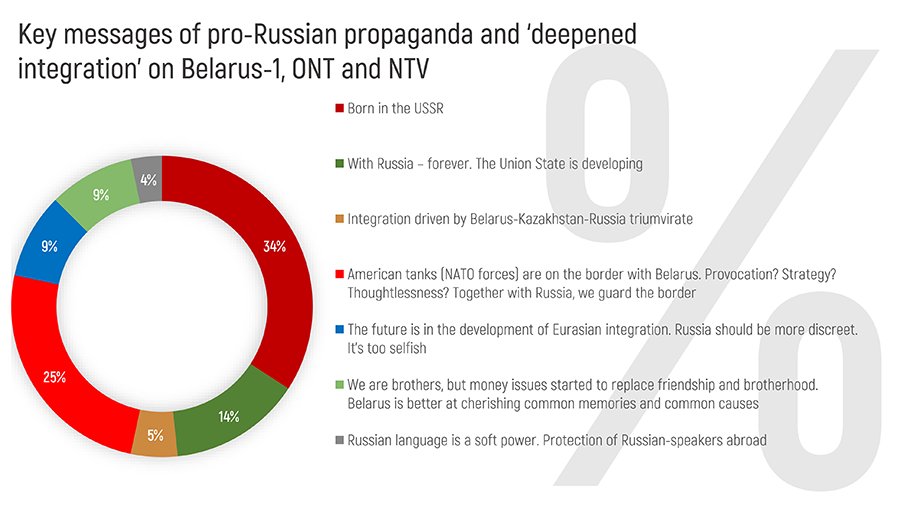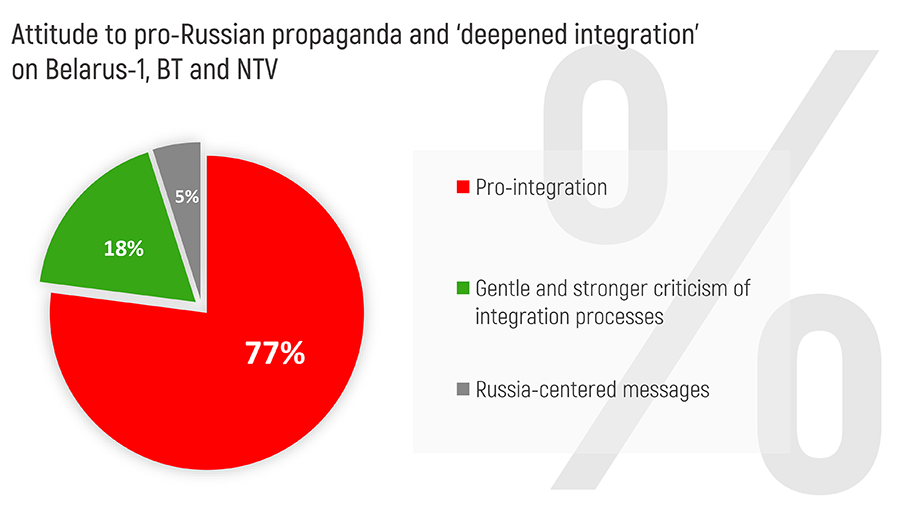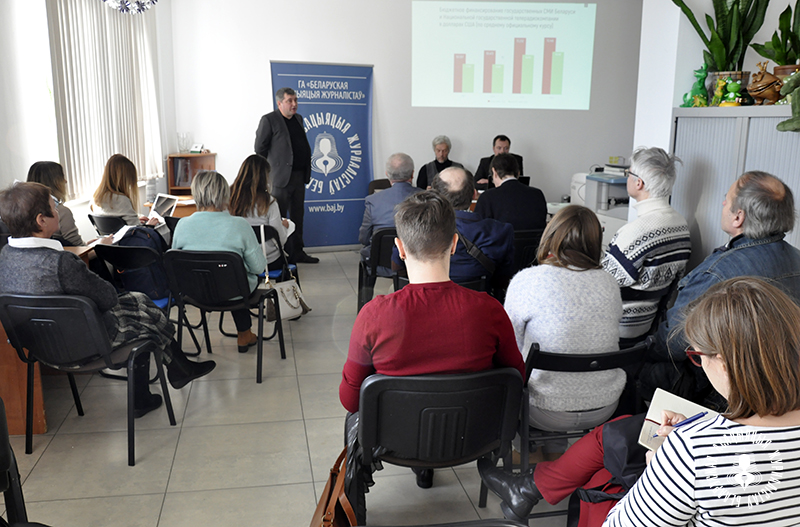No more praises for Russia: Media change focus in Belarus-Russia relations
On January 23, BAJ presented the results of its Monitoring of Pro-Russian Propaganda and Pro-Integration Rhetoric on Belarus State TV.

The Belarusian Association of Journalists published a Monitoring of Pro-Russian Propaganda and Pro-Integration Rhetoric on the state television of Belarus. Media experts point out a shift of emphasis and narratives in the coverage of Belarus-Russia relations over the last 12 months.
“There was almost no rhetoric about Moscow as our much needed ‘big brother’. The message was, there was that large project of integration and we were ready to participate, but the Russians seemed to be in no hurry. Lukashenka is pictured as the main integrator: he is the one showing leadership and is the most honest, but he has no luck with partners,” says media expert Maksim Zhbankou.
“Scanning the pro-government information flow (where news is not real news, experts are not real experts, developments are not real developments, and top stories do not make their way to the top, but are assigned as such) made an ambivalent impression. On the one hand, there was no fundamental change in overall tone and balance of meanings. On the other hand, the overall presentation of narratives around the alliance with the Eastern neighbor has become markedly different as compared to the study last year. The enthusiastic rhetoric went into doldrums.
Revealingly, the most emotional — nonetheless extremely conditional — happy speeches about our beautiful friendship were heard not from Belarusian, but from Russian politicians and officials (and outside of Russia, i.e. in Austria and Belarus). Russia is not praised, but admonished and reproached, ” the authors of the monitoring point out.
Presenting the results of the monitoring, head of the Belarusian Association of Journalists, Andrei Bastunets, noted that ONT, NTV-Belarus, and RTR-Belarus are both the most popular TV channels (among those included in the free TV package) and those with the largest amount of Russian-made content.
The share of Russian-made programs in prime time of one of Belteleradiocompany channels, NTV-Belarus, has remained very high — 74.2%. Furthermore, the airtime of Russian-made programs was even longer — 87% of the prime-time, while Belarusian news and socio-political programs were not broadcast at all.
Five of the eight channels covered by the study had the total time of Russian TV shows shown in prime time significantly exceeding 60% of the airtime.

Presence of some third-country content is insignificant and secured mainly with (mostly US-produced) movies. Ukrainian TV products that recently appeared on the Belarusian TV, are mostly of entertainment nature.
According to Andrei Bastunets, the integration process was barely mentioned in the Russian programs broadcast in Belarus. Meanwhile, Belarusian TV channels were bubbling over with news about NATO exercises in Lithuania and integration. Topics related to the Soviet past were actively used, and protection of the Russian language was also mentioned.
“The Germans are in town! My bad! It is the US deploying armor in Lithuania!”
(Belarus 1 news trail, 27.10.2019)
Belarusian TV people are eagerly using “born in the USSR” narratives, refering to the Soviet past: gifts for November 7 from the government, memories of the good things about the USSR. The narratives were exploited so actively as we monitored the media during the time when Belarus celebrates November 7.

The decrease in the degree of integration enthusiasm was accompanied by a shift of focus from a priority link to Russia itself to post-Soviet geopolitical alliances such as the Eurasian Economic Union, and the key role of the Belarusian President in them. With heightening tensions between Belarus and Russia in the economic sphere, the “sovereign” rhetoric has become noticeably tougher.
Curiously, the Russian news and feature programs broadcast by ONT and NTV-Belarus paid much less attention and less time to the topic of deep integration with Belarus than Belarusian TV programs per se. In fact, they didn’t mention it at all.
Growing criticism of integration processes and the behavior of the Russian government (especially towards the end of the monitoring period) did not spare the Belarusian TV from the ‘Russian World’ still dominating at various levels: from the overall Russia-centric map of the world to the prevalence of the Russian entertainment context. Just as a year ago, pro-Russian ideological and cultural attitudes were indoctrinated not only at the level of “direct” messages, but also through formation of an emotional and subconscious dependence of the TV audience on Russian content.

The authors of the monitoring emphasize that the measures taken by the Belarusian authorities to protect the country’s information space still do not seem to be an appropriate response to the real threats.
The Belarusian audience is systematically delivered a predominantly Russian media agenda and a pro-Kremlin view of major events in the world (including from Belarus government-funded TV). To a lesser extent, this applies to the Belarus-Russia relations per se.
The Belarusian authorities and TV producers should give thought to increasing the quantity of content produced by third countries and increasing the share of TV products in the Belarusian language (Belarus 3 TV can serve as a successful example of that). However, Maksim Zhbankou points out, with the lack of political will to build a free cultural space, the increase in the volume of Belarusian propaganda will not affect the situation significantly.
Download full text HERE (Russian language)

 @bajmedia
@bajmedia
